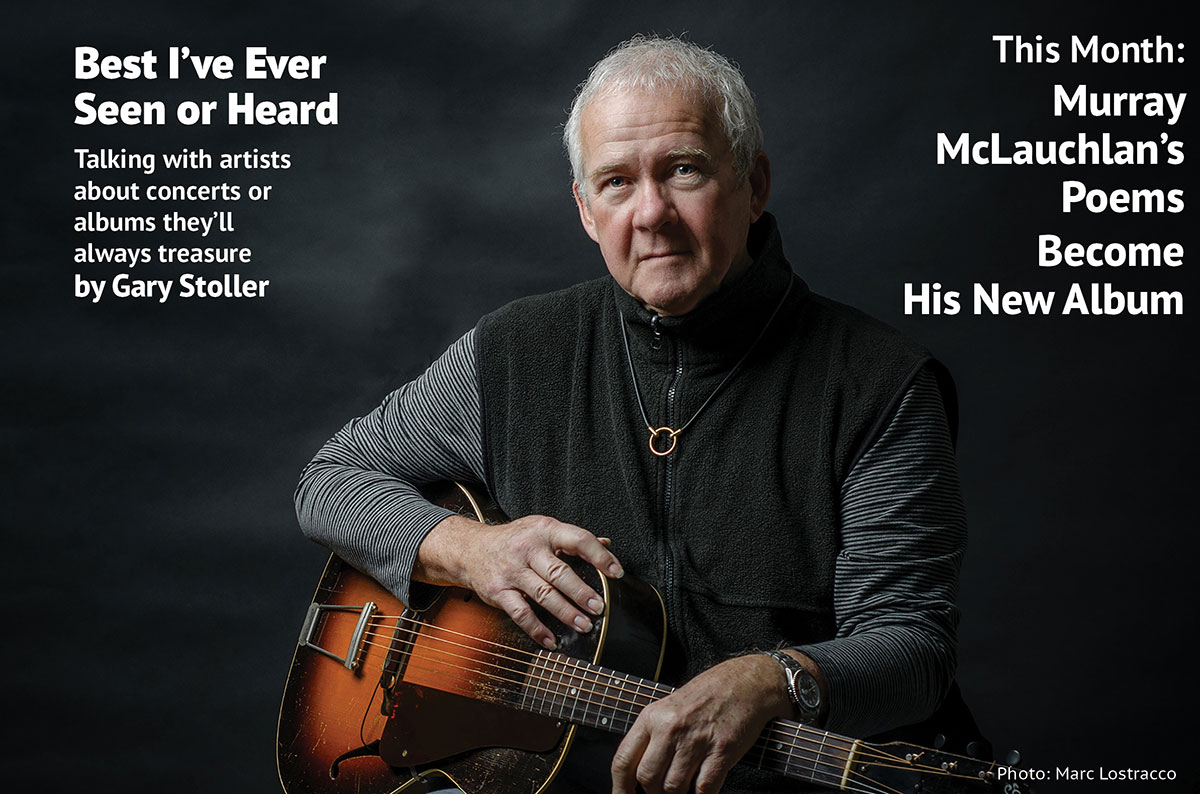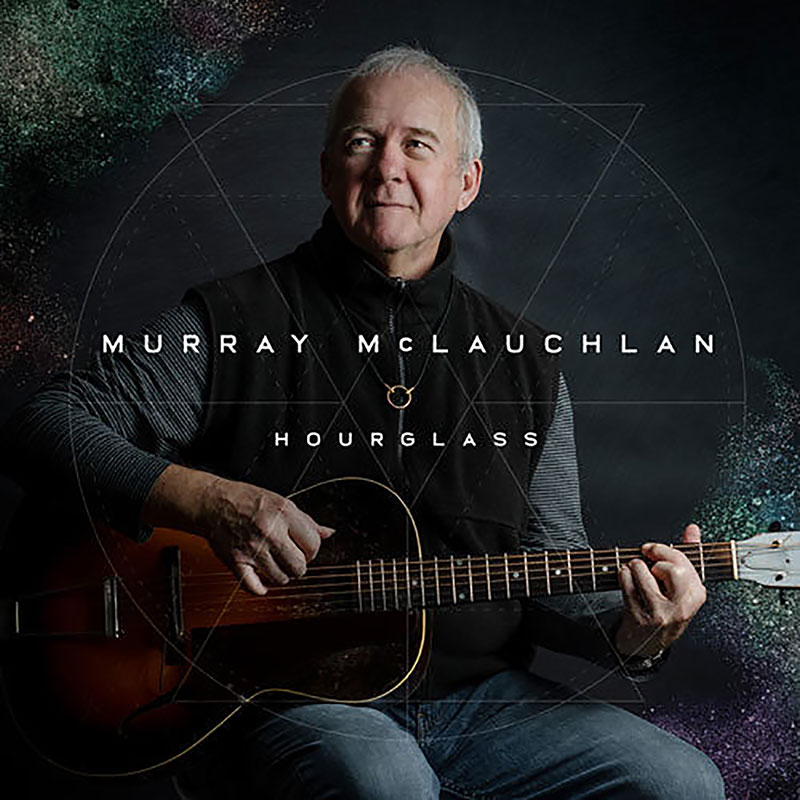
The songs on Murray McLauchlan’s new album Hourglass originated as poems when they were written June-November last year.
‘I was isolating in the beautiful lake country of Ontario, and some of the many things I had been thinking about for a while began to emerge creatively,” says the veteran Canadian singer-songwriter who is revered by Canadians as a major force in folk and country music. “The poems began to marry themselves to guitar pieces that I had been playing, and the results were different from normal song structure. There are no choruses, for instance. The songs keep referencing back musically instead to those guitar themes.”
Songs on Hourglass touch on current social, political and health issues. Who can’t relate to a song entitled “Pandemic Blues?”
“I don’t think anyone expected to live through a pandemic, although, in the back of our minds, I expect we always knew it was a possibility,” says McLauchlan, who has won numerous Juno awards (Canada’s Grammys) and was inducted into the Canadian Country Music Hall of Fame in 2016. “Bellwether warnings of Ebola, Zika and SARS were shrugged off. I read history, and, when this pandemic hit, I thought of the Spanish flu of 1918.
“I wrote ‘Pandemic Blues’ to remind folks that this has happened before, and we survived. Perhaps we’ve all grown a little soft, because this hasn’t happened in a while. Stick together, cheer up and carry on was the message. While you’re at it, figure out that cooperating with others and listening to science isn’t exactly a bad idea!”
I ask McLauchlan what triggered him to write “America” and whether his views of the United States have changed from the past through today. McLauchlan was born in Scotland, moved to Toronto at age 5 and spent a few years in the 1960s performing in New York’s legendary Greenwich Village folk scene before returning to Canada.

“The polarization of the United States and the election of a dangerous fool as president had me as an outsider looking on in horror,” he says. “Of course, the symptoms were there, even before the emergence of the Tea Party. The U.S. has seen demagogues before. Joseph McCarthy comes to mind, but the U.S. has always found a way to deal with them. The Republican Party is infested with them and needs a major reckoning.”
McLauchlan says he has “always greatly admired the United States” and, for years, listened to many U.S. friends’ existential fears.
“I wrote ‘America’ from the point of view of a child watching parents heading for a divorce, because that is what it looks like,” he says. “There are two Americas now, and they aren’t talking to each other. They’re just yelling and throwing the furniture around. My hope is that the U.S. will come together and sort out what kind of country it wants to be. My fear is that it won’t.”
Another song, “The One Percent,” was influenced by the Occupy Wall Street protests against economic inequality that began in New York City in 2011 and led to demonstrations in other cities and countries. Hundreds of protestors were arrested after they encamped in a Manhattan park and refused to leave.
“Those people were dismissed by conventional media rather derisively as being unable to articulate why they were there,” McLauchlan says. “I thought I understood why. They were afraid of globalization — of huge corporations operating globally without the checks and balances afforded by any one nation. They were angry at no one being held responsible from the big investment banks for the economic crash of 2008. They were afraid that life was no longer going to be better for their children.”
There’s been a “concentration of wealth on an unimaginable scale among fewer people, while the economic conditions of the vast majority continue to diminish,” McLauchlan says. “There is an erosion of trust in the institutions that are supposed to protect people from exploitation. John Kenneth Galbraith talked (President Franklin) Roosevelt into establishing the New Deal, because he rightly feared they might have a revolution on their hands if nothing was done about the results of the Great Depression. I think he was very wise.”
One song on Hourglass, ‘If You’re Out There Jesus,’ takes a playful poke at Christianity. McLauchlan says he was raised Presbyterian but no longer has any religious affiliation.
“One day I said to my stern Scottish father, ‘If you don’t go to church, why do I have to go to Sunday school?’ That was the end of that.”
“If You’re Out There Jesus” came from a feeling that humans “now face a long list of intractable problems that they are not doing a good job of solving,” McLauchlan says. “It’s an open letter to Jesus on the off chance he might actually exist in some other form than being historically a pretty nice guy and a good, if somewhat misinterpreted, teacher. I invited him to come back and give us a hand if the stories were true, and, by the way, could he come back as a black person just to stick it to the racists?”
I mention to McLauchlan that he, Gene MacLellan, Blue Rodeo and many other great Canadian musicians remain relatively unknown in the USA. Is the inability to spread one’s music south of the border a constant frustration?
“Sorry to disabuse you of that opinion,” McLauchlan responds, “but Gene found great success as a songwriter with the hit records of Anne Murray. I have played extensively in the U.S. over the years at major venues such as the Bitter End (in New York), the Philadelphia Folk Festival and the Earl of Old Town (in Chicago), and I even did a cross-country Boston-to-Berkeley tour with Neil Young. Recently, one of my songs was recorded by the U.S. rock band Widespread Panic.”
I ask McLauchlan who are his favorite Canadian musicians. “That’s a tough one,” he answers.
“There are many I admire. When I first heard Diana Krall in a club, she blew me away. Part of a tight little trio, I thought she was a hell of a soloist on piano. I admire Bruce Cockburn. He’s made such a great career out of beating a drum that people don’t necessarily want to hear, but he gets them listening anyway. I’ve always admired Joni Mitchell, because she’s fearless.”
Many Canadian musicians look up to McLauchlan and cite his influences on their music. I ask Canadian musician Sam Polley, the leader of Toronto-based band Sam Polley & The New Tomorrows, about this.
“Murray is a fantastic musician and person,” says Polley, whose band released its debut album, Time Forgot, last year. “I had the pleasure of meeting him a few years back at the Junos at a little gathering to hang out and jam all night. He was such a gracious player, and it was truly a blast to play along to his iconic songs.”
McLauchlan is “a pioneer for Canadian musicians and has shown a true dedication to his Canadian fans,” says Polley, whose dad, Jim Cuddy, co-founded Blue Rodeo with Greg Keelor. “I have always appreciated artists who, even when trying to break in the U.S. or elsewhere, still stay closest to their Canadian roots and show that love by playing coast to coast, even in towns with only a few people. I had heard some of Murray’s songs as a child and was aware who he was, but didn’t really explore his music until I was older, as I started to explore more of the great music we produce here. That’s when my appreciation really started to grow, leaving a real mark on me.”
I ask McLauchlan to name albums that made a mark on him — the three best albums he ever listened to.
“That’s another really tough one,” he replies, “but, okay, I’ll give it a try. Sinatra at the Sands, a live album with Count Basie and his orchestra, presents one of the greatest singers at the top of his game with one of the best big bands of all time. What’s not to love?”
McLauchlan also cites early albums by two other legends who became friends and recorded together, Johnny Cash and Bob Dylan. “When I was a kid, my brother brought home Johnny Cash with His Hot and Blue Guitar on Sun Records, and it blew me away,” McLauchlan recalls. “I have always thought Johnny Cash was a truly great songwriter, and this record is the proof.”
The Freewheelin’ Bob Dylan includes “one of the greatest human rights songs ever — ‘Blowin’ in the Wind’ — on this basic little record,” McLauchlan says. “It’s just a guy and a guitar and great songs.”
Which concerts were the best ones McLauchlan attended, and which ones influenced him most as a musician?
“In the 1970s,” he responds, “I was invited by the Columbia Records promo rep in Vancouver to come to a local club where Ray Charles was rehearsing for an upcoming tour. I had a front row table for Ray, an 18-piece horn section and the Raelettes. He blew the doors out of the joint for two hours. I thought I had died and gone to heaven!”
McLauchlan remembers sitting at a table with Jack Nicholson at a Jimmy Cliff show in Los Angeles. “Jimmy was brilliant, and, when he launched into ‘Many Rivers to Cross,’ I was standing on my chair! Did these shows influence me as a musician? Everything does!” Website: https://www.murraymclauchlan.com
The Singer As Painter
From the website: “Murray is creative by nature. He is a wordsmith and a composer. Most people, however, don’t know that Murray is also a wonderfully talented artist.”
Pictured here — Morning Stoney Lake

